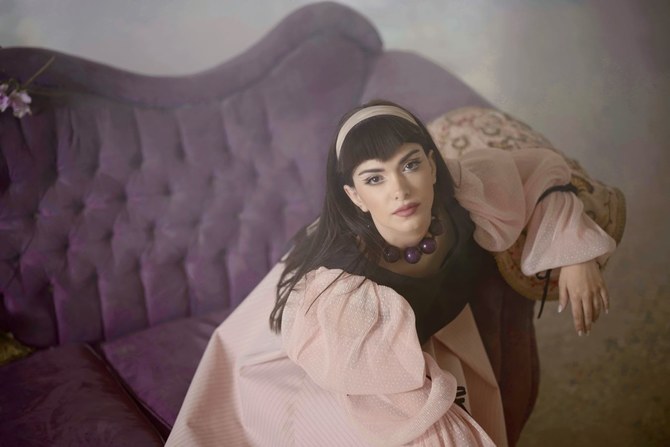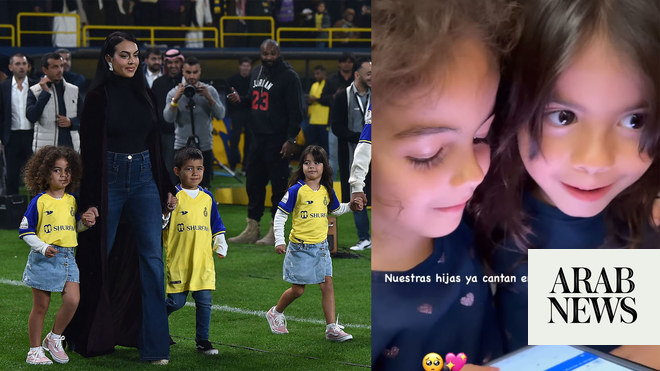
‘I didn’t want to copy today’s music,’ she tells Arab News
DUBAI: The Saudi-based Lebanese singer and songwriter Rima Yussef may still be in her twenties, but she’s an ‘old soul’ kind of girl.
For the latest updates, follow us on Instagram @arabnews.lifestyle
Yussef was born in Africa, but her family moved back to Lebanon when she was three-years-old. “What I remember most about my childhood in Lebanon is that I started singing at a young age,” she tells Arab News from Riyadh, where she now lives.
Her parents realized that their daughter, who started performing at the age of six, was different. For instance, she would sit in front of the television, listen to a song and memorize it right off the bat.
One day, Yussef’s father was training choral musicians at home, where she decided to join in — and even corrected their singing. “My father took it seriously and thought I should go to a music conservatory to learn music properly and professionally,” she says.
While some Arab families might discourage a career in the arts, her supportive family embraced it: Yussef’s father was a pianist and his brother was a poet. “But there was no singing talent in the family, except for myself. This was my dream. I wasn’t thinking of doing anything else,” she says. And so, Yussef became a student at a conservatory in the Lebanese mountain town of Bikfaya. She was apparently an exception amongst fellow pupils, since the school usually only accepted pupils who were at least nine years old. Yussef was six.
When she was growing up, Yussef mostly listened to the masters of classical tarab music — legends like Fayrouz, Umm Kulthum, Warda and Abdel Halim Hafez were just a few of her favorites. And she still believes that their music sounds better than popular contemporary artists.
“That was an era when people liked hearing ‘heavy’ music, which they were able to absorb,” she explains. “But today, we’re in a fast-paced environment. People want something that reaches them fast. They’re not bothered about the lyrics and melodies. Unfortunately, this has affected the quality of music.”
What sets Yussef apart from the current generation of young Arab singers is that she has, in a way, gone back to basics. She sings in formal ‘fus’ha’ or classical Arabic, in a modern style.
“I didn’t want to copy today’s music. Honestly, for me, if an artist is copying someone else, that means they don’t have something that distinguishes them,” she says.
Her introduction to recording modern standard Arabic happened when she was offered a song by lyricist Huzifa Arji and composer Ramy Chafei — “Ohebuka Raghman” (which roughly translates to “I Love You, Despite It All”). She says it was a song that got her “heart beating.”
“I didn’t have a particular plan to sing in classical Arabic. It was really by chance,” Yussef says. “I loved hearing ‘Ohebuka Raghman,’ but I wasn’t sure if people would accept it. It made me a bit nervous, but I wanted to take the risk and I did. I was amazed by people’s positive feedback. I love this song because it felt like a transition.”
The song’s video, which premiered in May 2022, has garnered more than five million views, a considerable achievement for an emerging talent.
Yussef is aware that, for some of today’s listeners, hearing a contemporary song in classical Arabic might sound awkward and outdated. But she hopes that, through her music, she can disassociate classical Arabic from being considered archaic. She has also been told by composers that it is hard to match classical Arabic with a modern beat (“They told me, ‘It’s impossible. You cannot make it’”). Nevertheless, Yussef followed her instinct, and persisted in composing songs her own way. Often, they are inspired by love.
“I don’t really think about what I’m going to write. I get inspired by what my mood is on a certain day. I might want to do a romantic song or a dance song,” she says.
For the past four years, Yussef has been signed to Universal Music MENA, which has opened the doors to collaborations with fellow label artists including Algerian producer Eljoee and Turkish musician Ragıb Narin.
One of her latest songs — “Next” — is perhaps her most obviously ‘pop’ song yet. In it, she sings about “a player who lost out on something”, “a love that came without a meaning.” She calls it her “craziest project, I wanted to do something outside of the box.”
Yussef is currently on a short sabbatical, having recently had a baby daughter. She moved to Saudi Arabia about a year ago, having previously lived in Lebanon and the UAE.
“I feel so happy in this country,” she says of life in the Kingdom. “I really feel good and at peace here in my home, which allows me to make more music. . . Saudi people really love and appreciate music.”
But, she won’t be away from her fans for too long. Making music is essential to her.
“Singing is a huge escape from everything: I feel like I’m in another zone, no matter what my mood is,” says Yussef. “Let’s say I’m in a bad mood, and I have a performance to do — when I’m singing I feel like I’m another person. I’m living another life.”








